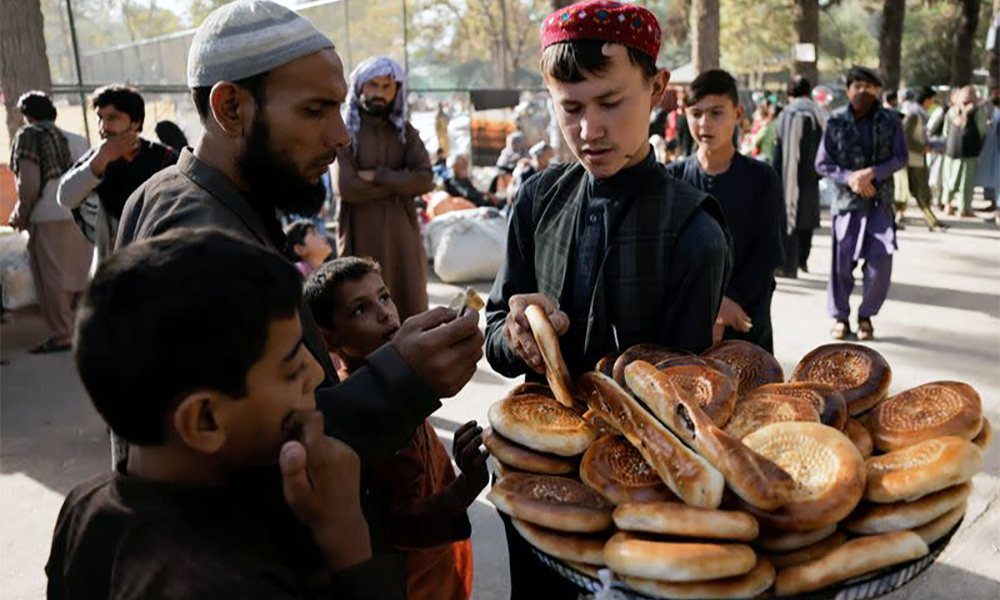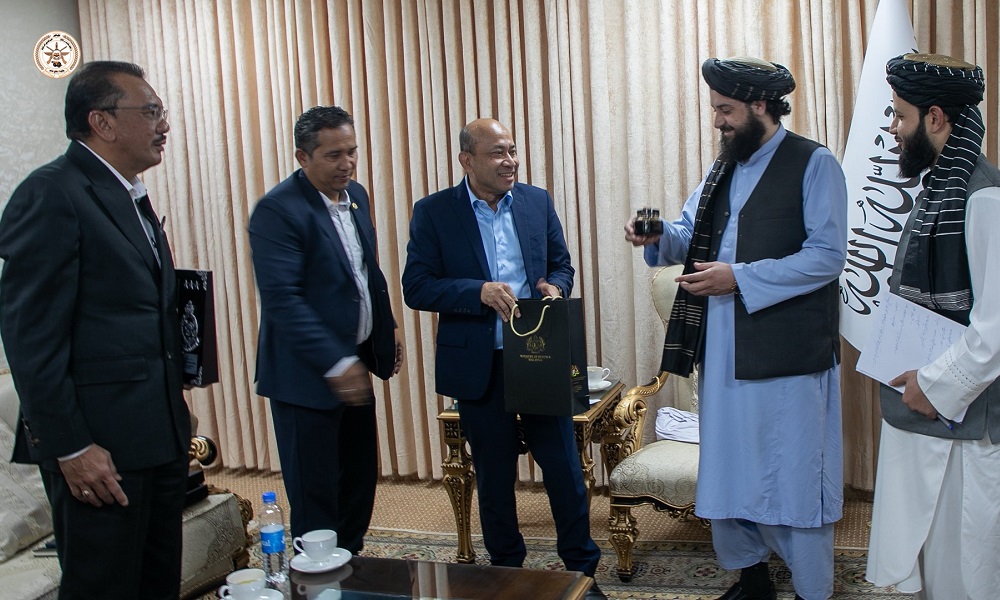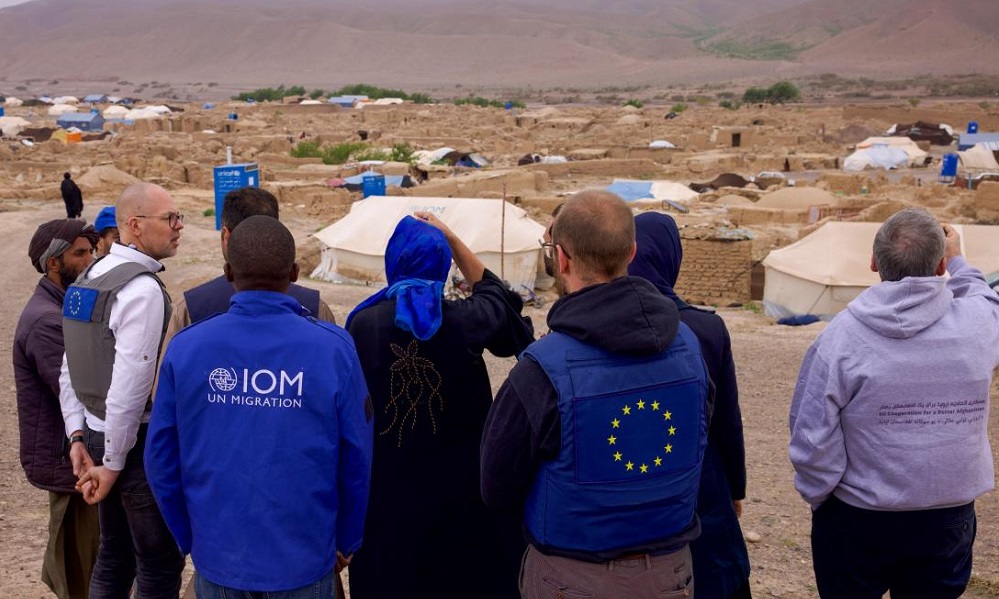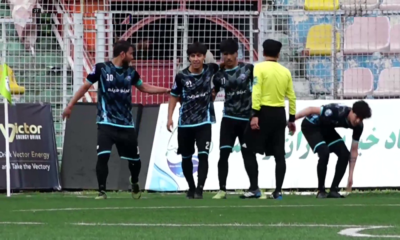Latest News
UN urgently needs cash in Afghanistan, but struggles for solution

The United Nations cannot get enough cash into Afghanistan to deliver humanitarian aid to millions of people on the brink of starvation and is struggling to develop options to help stabilize the collapsing economy, U.N. officials said.
Ultimately political solutions are needed, a senior U.N. official told Reuters on condition of anonymity, an apparent reference to sanctions relief and for governments and institutions to free up billions of dollars of Afghan assets held overseas.
In the meantime U.N. agencies are scrambling to find ways to get large amounts of U.S. dollars into Afghanistan to combat a liquidity crisis that has taken hold since the Islamic Emirate of Afghanistan (IEA) ousted the Western-backed government in August.
The U.N. official shared with Reuters some of the options being suggested.
The delivery of U.S. dollars to Afghanistan has stopped since the IEA seized power and if countries or international financial institutions don’t step up then the United Nations might have to fill the gap, said the official.
One suggested option is using Afghanistan International Bank, which could bring in and store money, but there are issues with insurance, the U.N. official said.
The United Nations is also aware that no one option will work and several avenues to get enough cash into Afghanistan are needed, the official said.
U.N. Secretary-General Antonio Guterres has called for the International Monetary Fund to agree on waivers or mechanisms to get money into Afghanistan. The IMF has blocked the IEA from accessing some $440 million in new emergency reserves.
Much of the Afghan central bank’s $10 billion in overseas assets have been frozen as well, most of it in the United States. The U.S. Treasury has said there are no plans to release the money.
“We need to work together to make the economy breathe again and to help people survive,” Guterres said on Wednesday. “Injecting liquidity into the Afghan economy can be done without violating international laws or compromising principles.”
The United Nations has repeatedly warned that Afghanistan’s economy is on the brink of collapse and would likely further fuel a refugee crisis.
When asked about U.N. efforts to get cash into Afghanistan, Mary-Ellen McGroarty, head of the World Food Programme in Afghanistan, told reporters on Tuesday: “The U.N. collective is looking at what potential solutions we could have, but flying in money to the country is not on the table yet.”
“What we are using at the moment is the limited liquidity that is in the country,” she said. “But the longer this goes on … we’re finding it’s becoming more and more difficult.”
Some 8.7 million people are “one step away from starvation,” said McGroarty, adding: “There is a tsunami of destitution, incredible suffering and hunger spiraling out of control.”
The IEA is facing growing international pressure for an inclusive and representative Afghan government and to uphold human rights, particularly those of women and girls in return for international recognition and freeing up aid and reserves.
Donors and institutions are also seeking to avoid running afoul of U.N. and unilateral sanctions on the IEA.
The United Nations is appealing for countries “to provide humanitarian financial exemptions to allow funds to reach aid organizations in the country,” said U.N. spokesman Stephane Dujarric, without naming names.
U.N. agencies and aid groups are currently using informal money-moving networks – known as hawalas – and small amounts of cash in banks to pay staff salaries and for other smaller scale purchases, Dujarric told Reuters.
“These modalities are not sufficient for the large scale operations requiring cash payments or cash assistance in-country, however,” said Dujarric, adding that the United Nations was talking to international financial institutions to find a solution that would expand aid operations.
A key part of U.N. plans to inject money into Afghanistan is by providing cash directly to poor Afghan families.
Latest News
Tripartite trade meeting held in Kabul to boost regional connectivity

A tripartite meeting between the delegations of Afghanistan, Turkmenistan and Kazakhstan was held in Kabul with the aim of connecting North Asia to South Asia and reducing transit and transportation costs among these three countries, the Ministry of Trade and Commerce said in a statement.
In this meeting, an agreement was reached on the creation of a joint technical committee to continue the talks.
This tripartite meeting was held under the leadership of Nooruddin Azizi, the Acting Minister of Industry and Commerce, Vice President of Turkmenistan and Srik Zhumangarin, the Deputy Prime Minister of Kazakhstan.
Earlier, a bilateral meeting was held between the delegation of the Islamic Emirate and Turkmenistan. The ministry of commerce said the participants of the meeting discussed the construction of a large joint logistics center in Torghondi, the trilateral transit agreement between the IEA, Turkmenistan, and Kazakhstan, the expansion of Afghanistan’s railway, solving issues related to Afghan transit and export goods, and a number of other commercial issues.
Latest News
No destructive groups including Daesh present in Afghanistan: Yaqub Mujahid

Acting Minister of National Defense Mohammad Yaqub Mujahid has said that no destructive groups including Daesh have physical presence in Afghanistan, adding the Islamic Emirate of Afghanistan (IEA) will not allow anyone to pose threat to any country in the region from the Afghan soil.
Mujahid made the remarks in a meeting with a delegation from Malaysia in Kabul on Thursday.
According to a statement released by the Ministry of Defense, Mujahid highlighted Malaysia’s “good treatment” of Afghan refugees and its long-standing relations with Afghanistan, and said that Malaysia is a powerful Islamic country and visits should increase.
He added that with the establishment of the Islamic Emirate, occupation and war ended in Afghanistan, and the country is fully secure.
Based on the statement, the Malaysian delegation called Afghanistan a friendly country and while emphasizing on comprehensive cooperation, it assured that what they have seen in Afghanistan will be shared with the authorities of their country.
Latest News
EU allocates 17 million euros to support Afghans on the move

The European Union signed an agreement worth 17 million euros with the International Organization for Migration (IOM) to improve access to basic services, increased economic opportunities and protection for Afghans on the move and their host communities in Afghanistan.
The needs of women and girls are a particular focus of the programme, EU said in a statement released on Thursday.
The statement noted that from January 2023 until April 2024, over 1.5 million Afghans returned from Pakistan and Iran.
“I am deeply moved by the hardship returnees face when being deported to Afghanistan. In a country suffering from poverty and climate change, and in a city that just saw devastating earthquakes, this truly is a crisis within a crisis.”, said Peteris Ustubs, Director for the Middle East, Asia and Pacific of the European Commission’s Department for International Partnerships during the signing ceremony at the IOM transit centre in Herat.
Raffaella Iodice, EU Chargée d’Affaires a.i. to Afghanistan, added “The solidarity of the Afghan people towards their brothers and sisters is an inspiration. We must assure that communities hosting and helping new arrivals are supported. The partnership with IOM ensures access to essential services and provides protection for Afghan returnees and their host communities. As women and girls can be particularly affected, we make sure that all members of society can benefit”.
“IOM’s continued partnership with the EU has been critical in enabling our teams to reach hundreds of thousands of Afghan returnees and other vulnerable communities in the country”, said IOM Afghanistan Chief of Mission, Maria Moita. “Thanks to this renewed commitment, we will be able to focus on addressing the immense challenges in the areas of return and contribute to reintegration, social cohesion, and longer-term solutions for those communities.”
This additional contribution is part of a 5-year programme that is being implemented across Afghanistan and in four countries in the region. It builds on the EU’s previous support to IOM to improve the wellbeing of Afghans forced to return to the country, EU said.
-

 Latest News3 days ago
Latest News3 days agoRashid Khan named AWCC’s brand ambassador
-

 Regional4 days ago
Regional4 days agoIranian president lands in Pakistan for three-day visit to mend ties
-

 Sport4 days ago
Sport4 days agoKolkata beat Bengaluru by one run in IPL as Kohli fumes at dismissal
-

 Sport5 days ago
Sport5 days agoACL: Aino Mina 3-0 Istiqlal Kabul; Attack Energy 3-0 Khadim
-

 Climate Change5 days ago
Climate Change5 days agoRescuers race to reach those trapped by floods in China’s Guangdong
-

 World4 days ago
World4 days agoMalaysian navy helicopters collide in mid-air, 10 killed
-

 Sport3 days ago
Sport3 days agoJaiswal ton powers Rajasthan to big IPL win
-

 Sport4 days ago
Sport4 days agoMawj Sahil player scores stunning halfway line goal in 1-0 win over Jawanan Wahedi
























